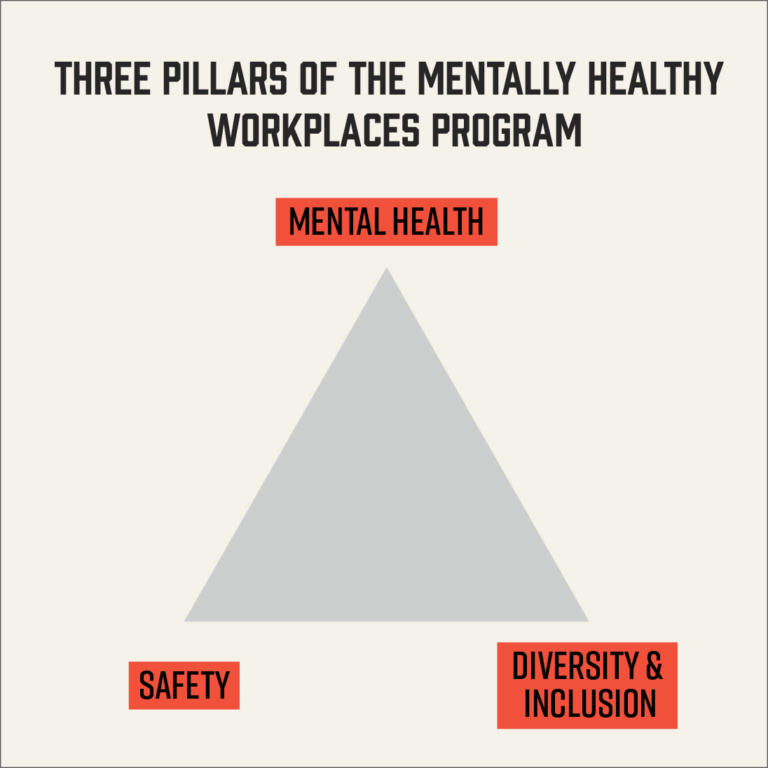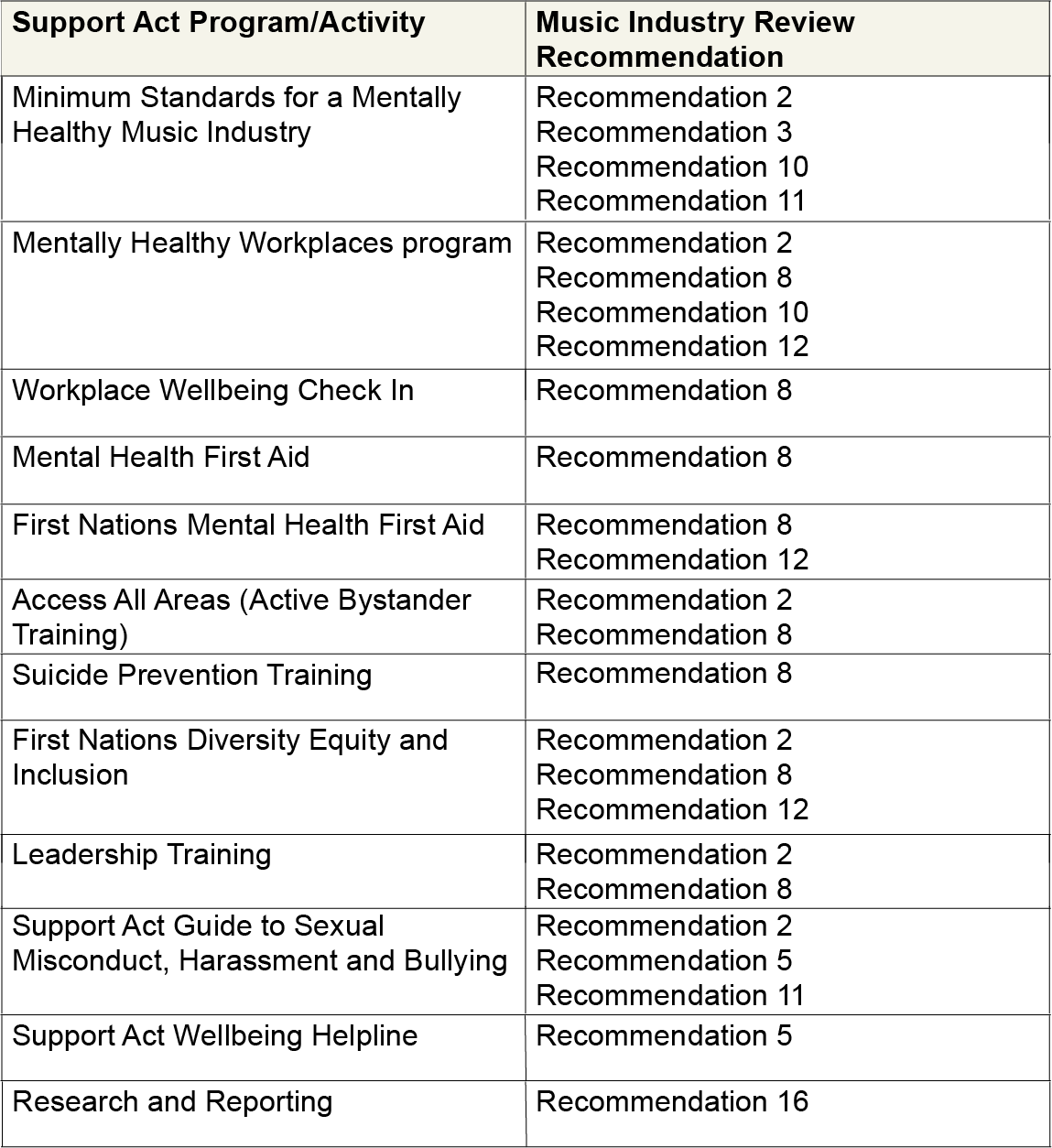Choose an Option
The Mentally Healthy Workplaces Program (MHWP) features a suite of industry-specific workshops and training sessions designed to promote mental health awareness, psychological safety and positive cultural change to help create a safe and thriving music industry for all.
In line with our First Nations Strategic Plan, the program will also deliver culturally intelligent, respectful and trustworthy support to all First Nations peoples accessing it.
It will support participants in meeting their legal obligations under the new Respect@Work legislation, which imposes a positive duty on employers and Persons Conducting a Business or Undertaking (PCBUs) to take proactive and meaningful action to prevent gender-based harassment, discrimination, bullying or victimisation from occurring at work or places connected with work.

The basics
Depending on the size of your organisation, these workshops can be delivered exclusively for your team. Alternatively, we have public-access sessions running throughout the year, where people across organisations can tune in online and take part.
Wellbeing Check-In
Access All Areas
A program designed to educate members of the music workforce on how to actively intervene when witnessing sexual harassment, assault and bullying.
Voices Amplified
The bonuses

Digital Resources

Brunch Bootcamp

Support Sesh
Go deeper
Mental Health First Aid
Suicide Prevention Training
An online, self-paced training to teach you how to recognise when someone is having thoughts of suicide, how to respond, and how to connect them to help and support.

Leading With Empathy
Why sign up?
The music industry is a fun and exciting place to work, however we understand that it can also be a challenging, isolating and unsafe place for many.
Harassment, bullying and discrimination have a huge impact on the mental health of music industry workers, as highlighted in our 2022 Mental Health and Wellbeing in Music and Live Performing Arts survey and the Music Industry Review’s 2022 Raising Their Voices report.
As the music industry’s leading charity and wellbeing advocate, we strongly encourage and promote safety, mental health and wellbeing best practice. Find out how our programs support the recommendations of the Raising Their Voices report.
So what can you do to help us build a healthier, happier and more inclusive music industry?
- Sign up and commit to our Minimum Standards for a Mentally Healthy Music Industry
- Talk to your organisation about starting this Mentally Healthy Workplaces journey
By taking part, your organisation will:
Frequently asked questions
Who is this program for?
Is there a minimum/maximum size for businesses who want to take part? Is it available to sole traders?
It’s important to us that everyone has the opportunity to take part. If you’re a sole trader or part of a small business with less than 8 employees, we’ll be providing open-access sessions (scheduled based on interest) throughout the year which will allow you or your small business the chance to move through all the offerings of the Mentally Healthy Workplaces Program, and gain accreditation.
If you’d like to find out more, contact [email protected] and we’ll get back to you shortly to discuss your requirements.
How much will this cost?
This program is currently free thanks to support from our donors and sponsors. If higher levels of customisation are required, then charges may be incurred.
How long does it run for?
The Mentally Healthy Workplaces Program doesn’t have a fixed end date and can continue for as long as your workplace is engaging with Support Act’s workshops and offerings.
Can we modify or rearrange the offerings?
What does Mentally Healthy Workplaces mean?
A mentally healthy workplace is one that promotes and supports the psychological wellbeing of its employees. It’s a work environment where employees feel valued, respected and supported in their work, and where their mental health is prioritised. A mentally healthy workplace should have the following characteristics:
Open communication: Employees should be able to communicate openly and honestly with their colleagues and superiors without fear of retaliation or discrimination.
Positive relationships: The workplace should foster positive relationships between employees, and support teamwork and collaboration.
Supportive leadership: Leaders should promote a culture of support and empathy, and be willing to listen to and address the concerns of their employees.
Work-life balance: The workplace should encourage a healthy work-life balance, with flexible working arrangements and policies that support employee wellbeing.
Mental health support: The workplace should provide resources and support for employees who may be experiencing mental health issues, such as access to counselling or employee assistance programs.
Training and development: Employees should be provided with training and development opportunities to enhance their skills and knowledge, which can contribute to their sense of purpose and self-esteem.
Overall, a mentally healthy workplace is one that recognises the importance of employee wellbeing and actively promotes a culture of positivity, support and growth.
What’s psychological safety?
In a psychologically safe workplace, employees feel comfortable and supported to speak up, ask questions and make mistakes without fear of negative consequences. This allows for open communication, creativity and collaboration, which can ultimately lead to improved performance, innovation and job satisfaction.
Psychological safety is important in any workplace because it allows employees to feel respected and valued, and encourages them to take risks and share their knowledge and expertise. It helps to create a culture of trust and inclusivity, which in turn can lead to higher levels of employee engagement, productivity and well-being.
Psychological safety is essential for creating a positive work environment where individuals feel comfortable and confident to express themselves, contribute to team goals, and grow both personally and professionally.
What do you mean by psychosocial hazards in the workplace?
Psychosocial hazards in the workplace refer to factors that can impact the psychological wellbeing of employees. These hazards can arise from a range of workplace factors such as the work environment, work organisation, job design, work demands, social relationships and leadership styles.
Examples of psychosocial hazards include:
Workplace violence: Threats, bullying, harassment, sexual misconduct or physical violence from colleagues, clients or customers can impact employee mental health and wellbeing.
High job demands: When employees are expected to work long hours, manage high workloads or complete tasks with insufficient resources, it can lead to stress and burnout.
Poor communication: Inadequate communication from management, unclear job expectations,or lack of feedback can cause anxiety and confusion among employees.
Poor social relationships: Negative relationships with colleagues, conflicts and lack of social support can lead to feelings of isolation and loneliness.
Poor leadership: Ineffective or unsupportive leadership, micromanagement and lack of recognition and feedback can negatively impact employee wellbeing.
Psychosocial hazards in the workplace can impact employee mental health, job satisfaction and productivity, and can lead to absenteeism, high staff turnover and increased health care costs. Therefore, it is essential for organisations to identify and manage psychosocial hazards in the workplace to promote employee wellbeing and organisational success.
How does this program relate to the recommendations of the Raising Their Voices report?

How do we sign up?
Email [email protected] to register your interest and we’ll get back to you shortly to discuss your requirements.



